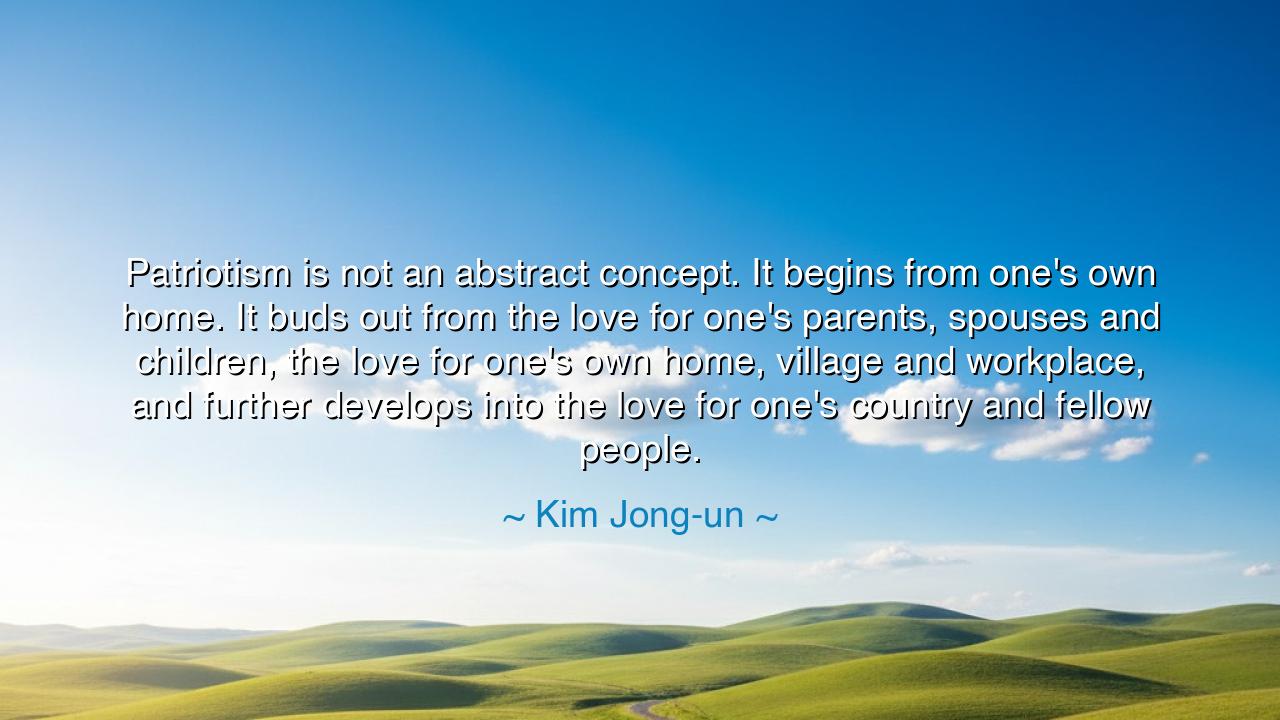
Patriotism is not an abstract concept. It begins from one's own
Patriotism is not an abstract concept. It begins from one's own home. It buds out from the love for one's parents, spouses and children, the love for one's own home, village and workplace, and further develops into the love for one's country and fellow people.






In the solemn and reflective words of Kim Jong-un, we encounter a vision of loyalty that rises from the smallest hearths to embrace the greatest of human bonds: “Patriotism is not an abstract concept. It begins from one's own home. It buds out from the love for one's parents, spouses and children, the love for one's own home, village and workplace, and further develops into the love for one's country and fellow people.” This statement, though born of political philosophy, transcends borders and ideologies—it speaks to an ancient truth: that love of nation must first be rooted in love of family, and that no devotion to a flag or land can be genuine if it does not spring from affection for the lives that dwell within it.
To the ancients, this truth was sacred. The philosopher Confucius, whose wisdom shaped the moral foundation of the East, taught that filial piety—the love and respect one gives to parents—is the root from which all virtue grows. From this filial devotion flows loyalty to community, and from that, loyalty to country. Without harmony in the home, the state becomes chaotic; without compassion in the heart, patriotism becomes hollow. Thus, when Kim Jong-un speaks of patriotism “budding” from the home, he echoes this age-old belief: that one cannot truly serve the nation without first learning to serve and love the people closest to them. The home is the first classroom of citizenship, the family its first flag.
In the Western world, too, the ancients understood this law of love. Cato the Elder, the Roman statesman, once said that the strength of Rome lay not in her armies or her laws, but in the virtue of her households. Each citizen who honored his parents, raised his children well, and served his neighbors was a pillar of the Republic itself. The soldier who marched beneath Rome’s eagle carried within him the memory of his wife’s voice, his father’s lessons, his child’s laughter—these were the roots of his patriotism, not the golden laurels of conquest. It was from the love of home that courage was born.
To love one’s country without loving one’s home is to love a shadow, not a substance. True patriotism, as the quote reminds us, is not loud slogans or public displays of loyalty—it is the quiet integrity of everyday life. It is the farmer rising before dawn to till his fields with care, the mother teaching her children kindness and honesty, the worker performing his craft with pride. These small acts form the foundation upon which a nation stands. A country, after all, is nothing more than the sum of its families, its friendships, its shared labors. When these bonds are strong, the nation flourishes; when they are neglected, it withers from within.
History itself testifies to this. In the time of Japan’s Meiji Restoration, the country rose from isolation into modern strength not merely through industry or reform, but through the spirit of its people—men and women who saw their duty to family as inseparable from duty to country. They rebuilt schools, tended fields, taught their children honor and perseverance. Their patriotism was lived, not proclaimed. It began in their homes and extended outward, until the entire nation pulsed with the energy of collective purpose. They proved that true national pride is not a fiery outburst, but a steady flame tended daily by the hands of ordinary people.
Yet, there is also a warning hidden in this wisdom. When patriotism is detached from love—when it becomes abstract, ideological, or cold—it loses its humanity and becomes dangerous. Love of country must never demand hatred of others; it must grow from compassion, not conquest. The one who loves his own family learns to understand the families of others. Thus, the wise patriot is not blinded by borders, but enlightened by empathy. The seed of love for one’s people, once mature, blossoms into respect for all peoples.
So, my children of the future, take this teaching to heart: patriotism begins not with the nation, but with the heart. Cherish your parents, honor your teachers, care for your neighbors, and serve with integrity wherever life has placed you. Let your love ripple outward—from home to village, from village to country, and from country to humankind. For only when the hearth burns brightly will the nation stand unshaken, and only when love rules the home will peace rule the earth. Remember always: the greatest service to one’s homeland begins not on the battlefield, but at the breakfast table, where respect, gratitude, and compassion are first learned.






AAdministratorAdministrator
Welcome, honored guests. Please leave a comment, we will respond soon